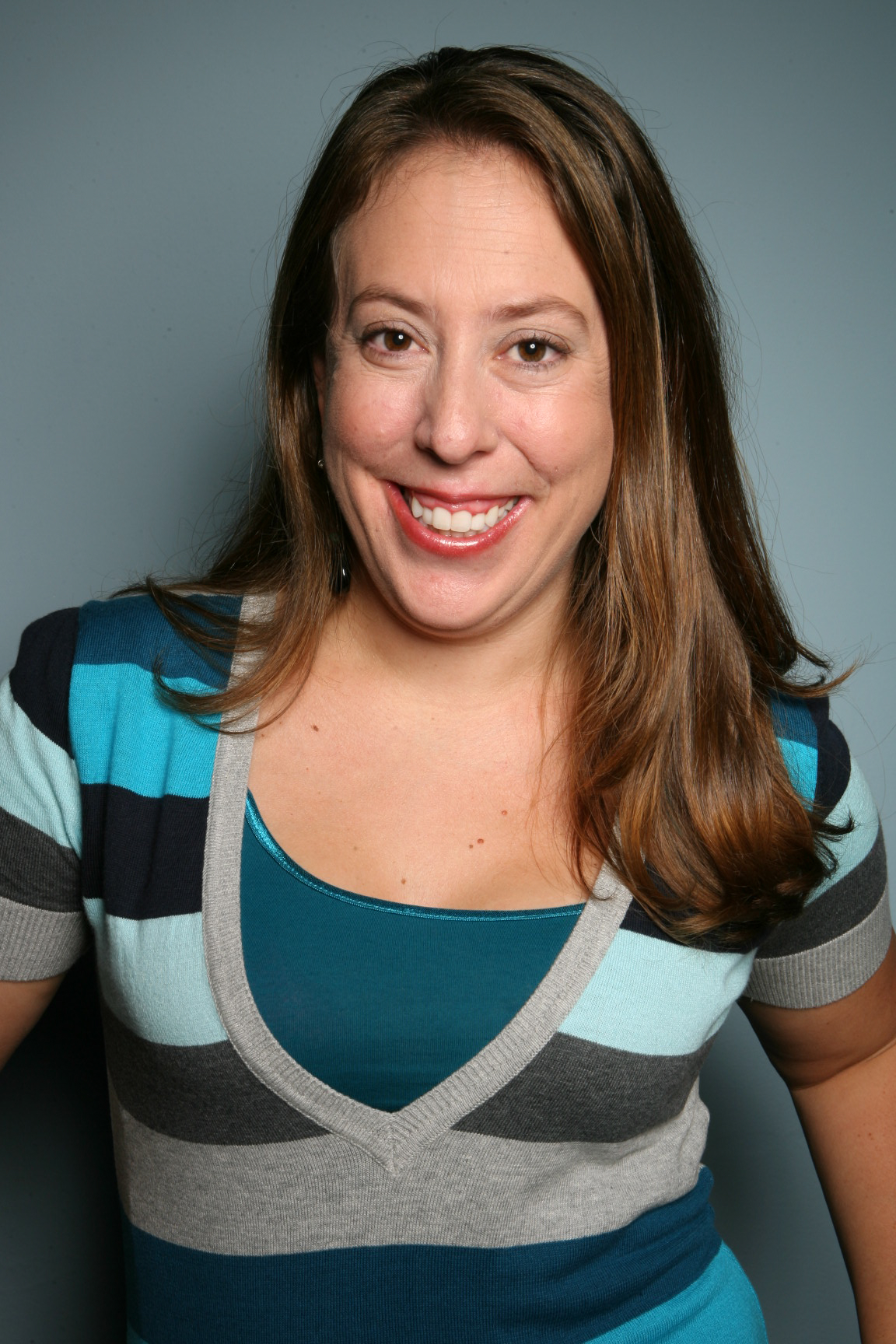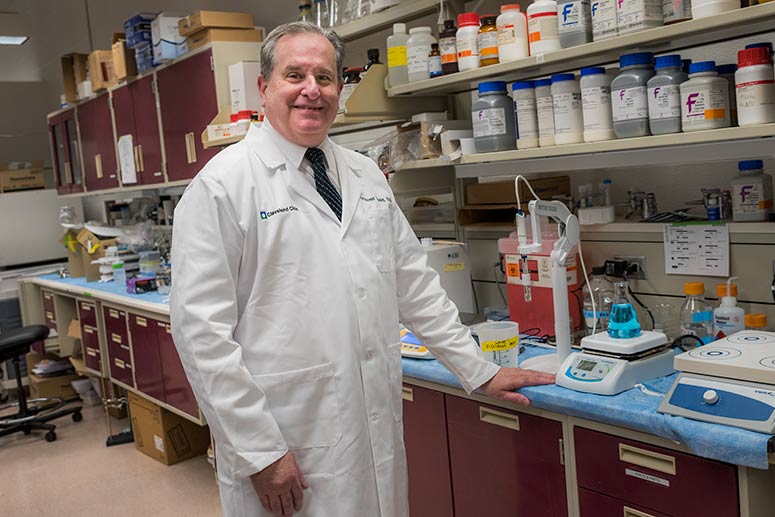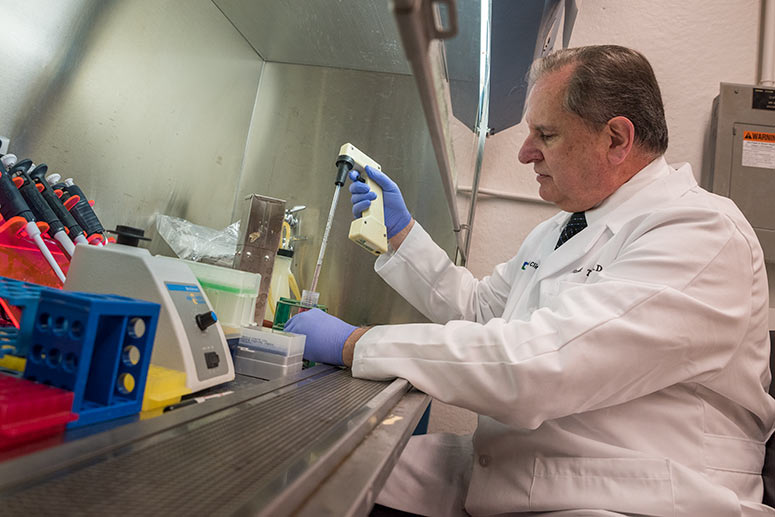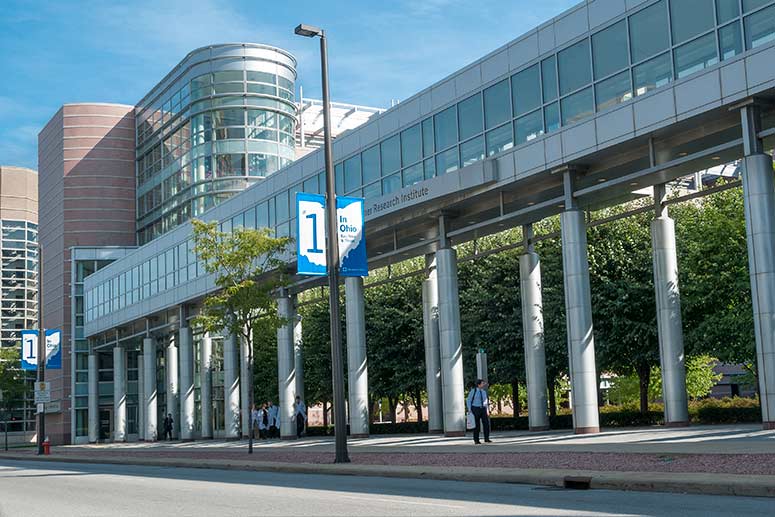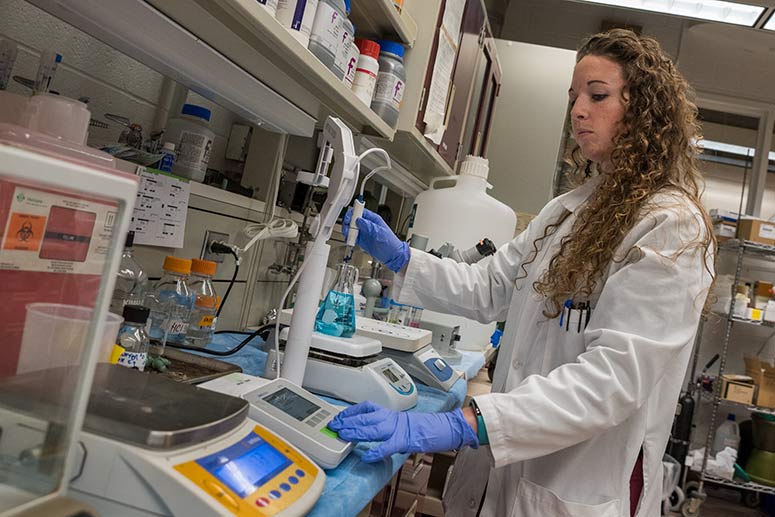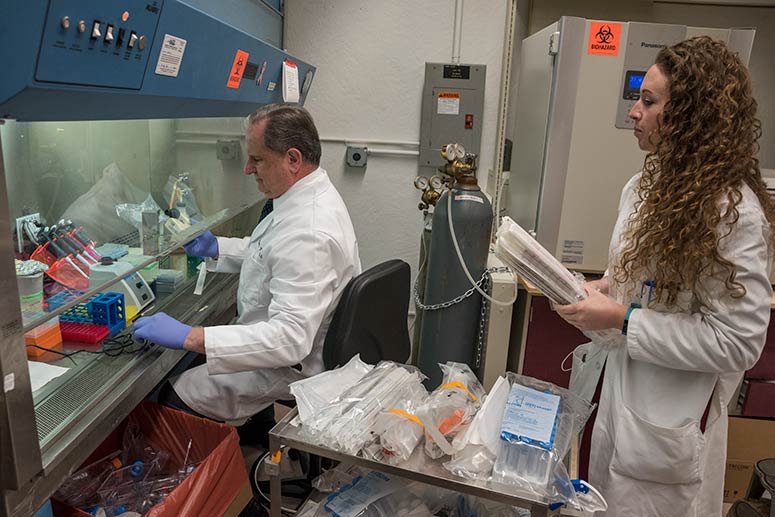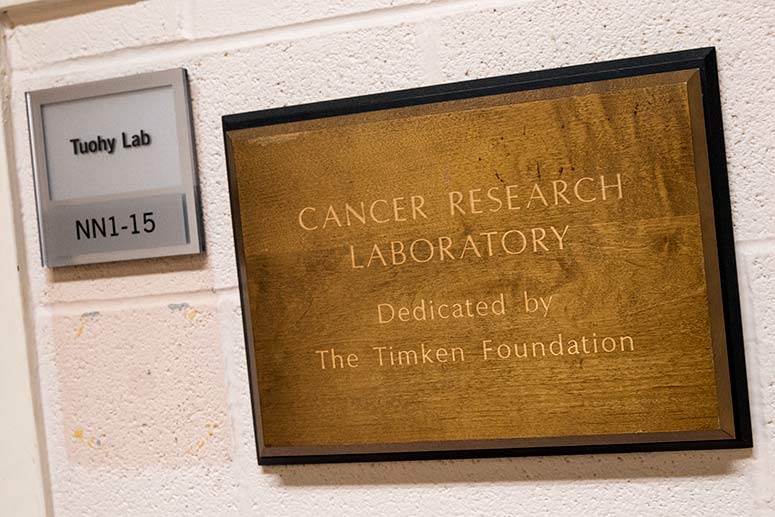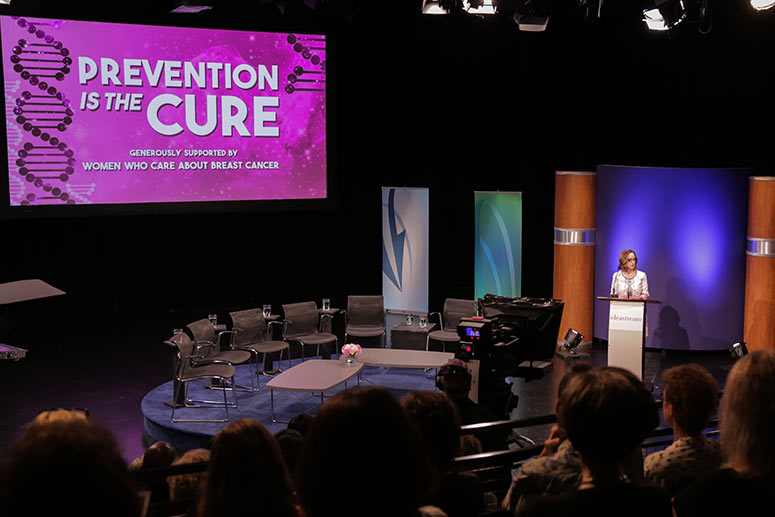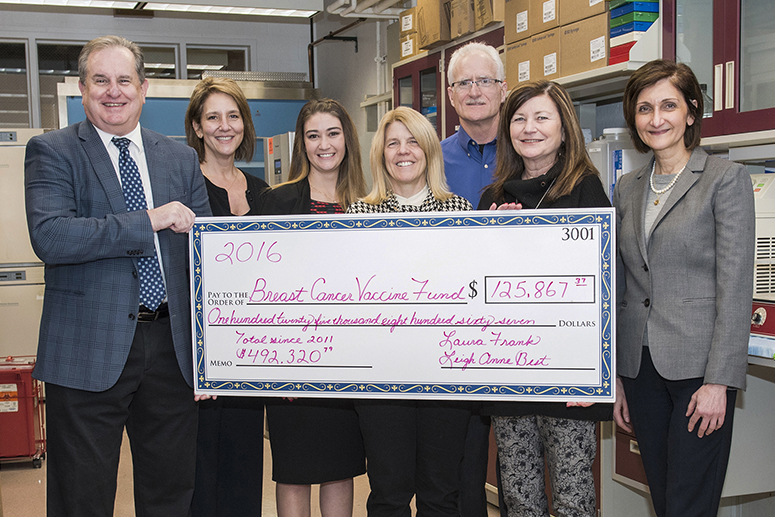This Cleveland Clinic doctor is close to making breast and ovarian cancer vaccines a reality
When it comes to the Greek myth of Sisyphus, Dr. Vincent Tuohy, Ph.D., can relate. Since 2002, the Cleveland Clinic-based doctor has been working to develop game-changing vaccines that may be able to eradicate breast cancer and ovarian cancer. Though his research and early trials with mice have been promising, Tuohy has experienced an "uphill struggle" getting buy-in from the medical community at large.
"With a novel idea, the first reaction is resistance and pushback—people are intimidated by new ideas," says Tuohy. "I often liken it to the myth of Sisyphus. He had to push a boulder up a hill, and just before it would reach the top, it would roll back down again. He had to do that for eternity, and that's what it feels like I've been doing for the last [15] years."
Yet it seems like Tuohy may be on the verge of reaching the proverbial tipping point. In early November, the peer-reviewed journal Cancer Prevention Research will publish Tuohy's paper about his ovarian cancer vaccine, and he also recently received a $6 million grant from the Department of Defense in late September towards his breast cancer vaccine efforts.
"It feels like we're finally getting some traction," says Tuohy, who says he's been turned down more than 15 times for funding in the past. "Someday in the future, we will look back at this time and say, 'Could you believe they didn't have the breast cancer vaccine [then]?' That will be the success I'm hoping for."
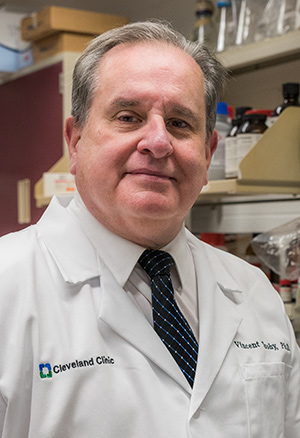 Dr. Vincent TuohyShifting the mindset
Dr. Vincent TuohyShifting the mindset
As Tuohy sees it, the current approach to treating adult onset cancers is backward. Rather than treating cancer aggressively from a reactive perspective, Tuohy believes the most logical approach is a proactive one.
"We live in an era where we deal with cancer by waiting for it to happen and then beating the daylights out of it," says Tuohy. "What I'm proposing is not offense in the form of radiation and chemotherapy, but a defense in the form of a preventive vaccine. We need to change the treatment mindset for controlling cancer."
Tuohy says the missing link is an adult vaccine program that will protect from diseases associated with aging, like breast cancer, ovarian cancer, and prostate cancer. "The entire childhood vaccine program is probably the greatest medical intervention in history in terms of reducing mortality and morbidity," says Tuohy. "What's missing in our culture is an adult vaccination program that provides primary immune prevention of diseases we confront as adults. It's a giant deficiency in our healthcare that we simply do not have primary immune prevention against adult onset diseases like breast, ovarian, and prostate cancers."
According to Tuohy, breast cancer currently kills about 40,000 women annually, while ovarian cancer kills approximately 15,000 women each year. The most lethal form of breast cancer is known as Triple Negative Breast Cancer, which is what Tuohy's vaccine targets. "Triple negative accounts for 16 to 20 percent of all breast cancers, but it's responsible for a disproportionately high percentage of deaths," says Tuohy. "If we can prevent the most lethal form, we can start to prevent other forms, and that's what my lab program is focused on."
If Tuohy's lab results are any indication, he may be well on his way. Several years ago, Tuohy’s lab showed that the breast cancer vaccine was capable of preventing breast tumors in animal studies that included mice genetically engineered so that 100 percent of them would develop breast cancer at 10 months of age. Some of the mice were vaccinated with the breast cancer vaccine at two months old, while control mice were sham vaccinated.
"At 10 months, none of the vaccinated mice had tumors, and all of the control mice had tumors," says Tuohy, who has replicated similar results in several other related experiments.
Tuohy's vaccine contains a protein thought to be a marker for triple negative breast cancer (except in lactating women). Though it may seem revolutionary, Tuohy says that the development process for the vaccine was actually the easy part—it's bringing it to market that poses the biggest challenge.
"The vaccine was easy to make; the simplicity of it always amazes me," says Tuohy. "The hard part is changing minds. If you look at the budget for the National Cancer Institute, the budget is five times higher for treatment than prevention. It's the stubbornness and the inertia of the treatment paradigm that is my biggest enemy."
A groundswell of support
Though the medical community has been slow to embrace Tuohy's vision, Tuohy has cultivated a strong following of supporters here in Cleveland. Chief among them is the Women Who Care About Breast Cancer coalition, which was formed by clinical psychologist Marjorie Moyar and former Race for the Cure organizer Susan Larson about five years ago.
"I was at a gathering at the Cleveland Clinic, and the head of the Lerner Research Institute passed around a sheet of paper with eight different programs that needed attention," recalls Moyar. "And there it was: 'breast cancer vaccine.' I felt that if every woman who knew someone with breast cancer or was a survivor gave a small amount of money, we could make a big difference."
Moyar teamed with Larson and made that her focus, enlisting the help of organizations like the Junior League, Philoptochus Society, Daughters of Penelope, and others to raise money to support Tuohy's work. To make his work more accessible, the coalition has also hosted events like "Walk with a Doc" in which women were able to interact one-on-one with Tuohy to ask questions and learn more.
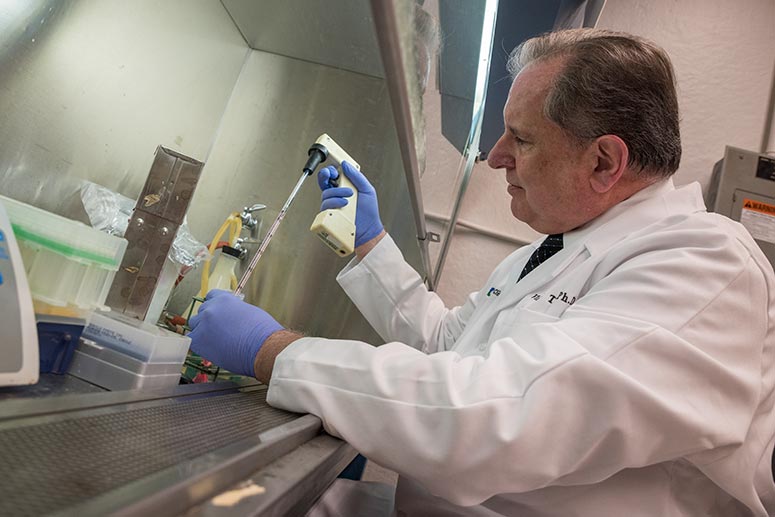 Dr Tuohy at the Cleveland Clinic Cancer Research Lab
Dr Tuohy at the Cleveland Clinic Cancer Research Lab
Brakes for Breasts is another initiative which has raised close to $500,000 since 2011 (not including this year's total) to bolster Tuohy's research. Every October during Breast Cancer Awareness Month, independent auto repair shops around the country give free brake pads for every brake service performed. Customers pay only for the labor and other parts, and 10 percent of the brake service fee is donated to The Cleveland Clinic Breast Cancer Vaccine Research Fund.
The program was founded by Clevelanders Leigh Anne Best, marketing director for Medina-based Mighty Auto Pro, and Laura Frank, co-owner of Brookpark-based Auto Repair Technology and Brunswick-based Royal Car Care. Their shops had participated in a similar program called Brakes for Kids (a fundraiser for the Berea Childrens Home, now known as Guidestone), and they felt they could make an impact by starting their own initiative along the same lines.
"Laura has a philosophy that as business owners there is a lot of visibility, and with visibility comes responsibility," says Best. "One night over dinner, we were discussing what we could do to hopefully make the world as a whole a better place. That evening, we took our local platform with Brakes for Kids and used the same concept to create Brakes for Breasts."
Their two criteria for choosing Tuohy's cause were that 100 percent of proceeds had to directly benefit the recipient (requiring everyone behind the scenes to donate services and time strictly on a volunteer basis) and the recipient had to be a worthy one.
"We searched high and low from coast to coast and interviewed many organizations," says Best. "It was very disenchanting when we really looked how very little of what we were potentially going to donate actually went towards the actual cause they were supporting." After mentioning this at a networking meeting, Best was connected to Tuohy, and Brakes for Breasts was born.
Best says the program has "exploded from there," and they've continued to enlist more auto shops each year through direct outreach and word-of-mouth. The program started with just five Cleveland shops in 2011 and now encompasses 146 shops in 35 states.
The guiding aim for both The Women Who Care About Breast Cancer and Brakes for Breasts is to support Tuohy in shaping the future for the next generation of women by eradicating the need for preventive mastectomies and aggressive treatments in favor of a less invasive option. "This vaccine is for our daughters and granddaughters," says Moyar. "When they grow up, they’ll have this option of a vaccine instead of facing surgery, chemo, or radiation."
Looking ahead
In September, Tuohy participated in an Ideastream panel moderated by WOIO-19 anchor Romona Robinson that included experts like board-certified radiologist Dr. Margaret I. Cuomo, M.D.; Cleveland Clinic Ventures managing director Jack Miner; Cleveland Clinic Medical Breast Services director Dr. Holly Pederson, M.D.; and Pink Virus Project creator Dr. Kathleen Ruddy, M.D. Titled "Prevention is the Cure," the panel explored the current state of breast cancer in America and how the introduction of a vaccine could revolutionize it.
Tuohy recognizes that there is still a long road ahead, despite recent momentum. The next step is facilitating various clinical trials, which will likely take 10 years to complete; he hopes to begin the trials in late 2018. "What I'm doing is not the final answer for breast cancer—this is a long journey," says Tuohy. "But this is the first step in a very long journey that hopefully over the next two decades will lead to a well-developed adult vaccination program."
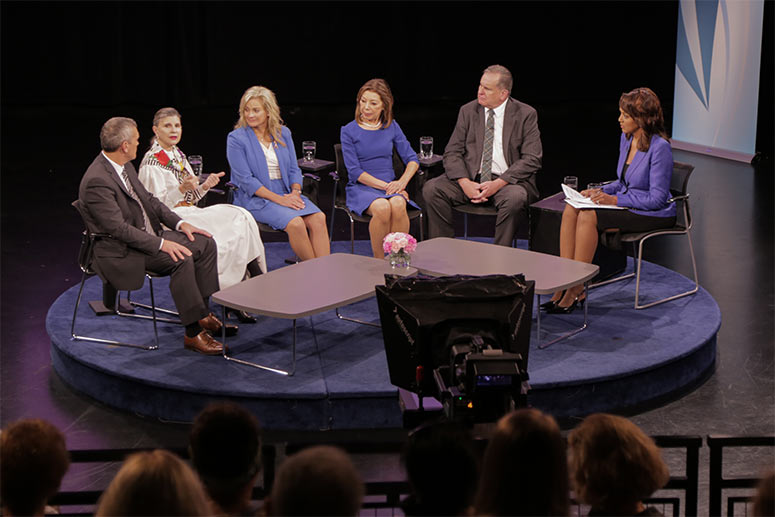 ideastream panel discussion on the possibility of a breast cancer vaccination in September
ideastream panel discussion on the possibility of a breast cancer vaccination in September
The breast cancer and ovarian cancer vaccines have wide implications for helping reduce not only the physical and emotional burdens that accompany cancer, but also the economic burden on society. "It will just get more expensive to treat cancer, and if we don't reduce the tumor load upfront, we won't be able to afford it," cautions Tuohy. "[This vaccine] is going to happen because it has to happen."
The way Tuohy sees it, he hopes to cultivate a culture of "previvors" rather than survivors and make adult vaccination just as common as childhood vaccination.
"Ultimately, I'd like to see all women [receive breast and ovarian cancer vaccines] the same way we go in for a pneumococcal vaccine or shingles vaccine," says Tuohy. "Someday, I want people to be able to take them for granted the same way we take for granted the childhood vaccination program that prevents diseases caused by 16 different pathogens. If the work I’m doing eventually gets taken for granted, that would be success."
See the Ideastream panel in full here:
